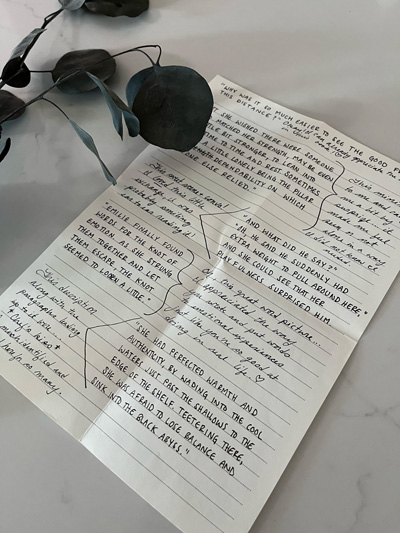My professor said I’d never be a creative writer. And I believed him.
So, I set about helping others express their voices on the page. I loved the writer’s magic. That delicious hunt for the perfect ingredients—words, connectors, and cadence. But it wasn’t my voice. Meeting writers who could shape characters, string them along in a story, and bring its humanity full circle was awe-inspiring. It still is.
But then it happened. Waking early the day after Christmas, sitting in my favorite chair long before the sun came up, I typed the two lines of a character that had lifted from my mind in the night. And I kept writing. I couldn’t stop. More characters introduced themselves. Place and time came into sharp focus. One month later, I held a draft of a novel in my hands. When it was over, I crashed emotionally in the best way.
Writing a novel in one month isn’t normal. But for me, it was needed. That old professor was lurking in the dark corners of my mind to sneak in and snatch it away, not to mention my own self-doubt. I kept going, discovering something locked inside I’d never known was there. My own voice.
My characters and I had conversations. They surprised me with secrets about themselves. I cried with them; I laughed with them. They annoyed me—disappointed at their choices that affected others. And sometimes, I wished things couldn’t be lighter, happier, or easier for them. But that wasn’t their truth. And when they fought their own self-doubt and won, I gloried in it.
To be fair, my professor wasn’t wrong about my story. What I turned in was a dud. I was so fixated on a compelling story that I forgot to write the people. But I let one failed attempt turn off a world of possibility.
So, here I sit a year later, two complete historical novels, a children’s book, and two other novels mid-stream. When I sit to write about the people, that’s when the story begins to tell itself.
What’s standing in your way? What or who is lurking in your mind to squash your dreams? Where’s your voice? It took me a long time to find mine, but it was waiting to be discovered. I want that to be your story, too.
My home recipe for writer’s magic:
- Add ingredients: Pour it out on the page. Just write and write. You can make it perfect later.
- Mix: Move things, rework, finesse.
- Add a dash of new perspective: whether beta readers, an honest friend, or a writer’s workshop, another perspective can help you feel less alone and see gaps in your writing.
- Let it rest: If you’re feeling tired, depleted, or uninspired, give yourself a break. Write a different genre. Fill up on nature, novels, friends, and life. You’ll know when it’s time to pick it back up.
- Take the heat: Criticism, long waits, and rejection are brutal. But stay in it! You’re sharpening and growing and refining yourself and your craft.
- Take it from the top: When your manuscript is fully baked, start a new one. Keep writing!
- Enjoy!


